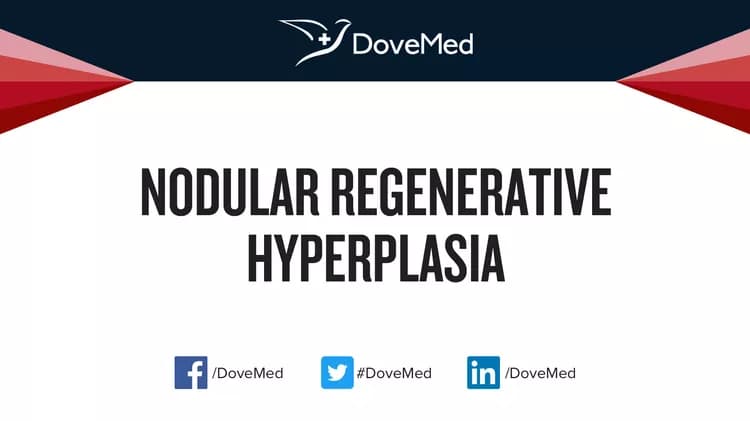What are the other Names for this Condition? (Also known as/Synonyms)
- Miliary Hepatocellular Adenomatosis
- Non-Cirrhotic Nodular Transformation
- Non-Cirrhotic Portal Hypertension
What is Nodular Regenerative Hyperplasia? (Definition/Background Information)
- Nodular Regenerative Hyperplasia (NHR) of the liver is a rare parenchymatous liver disease characterized by diffuse benign transformation of the hepatic parenchyma into multiple small nodules (composed of regenerating hepatocytes) and that is usually asymptomatic but can lead to the development of non-cirrhotic portal hypertension and its complications, including esophageal variceal bleeding, hypersplenism and ascites
- It is often associated with rheumatologic, autoimmune, hematologic, and myeloproliferative disorders as well as various immune deficiency states and exposure certain drugs and toxins
(Source: Nodular regenerative hyperplasia of the liver; Orphanet, National Institute of Health and Medical Research (INSERM), Paris.)
Who gets Nodular Regenerative Hyperplasia? (Age and Sex Distribution)
- Nodular Regenerative Hyperplasia is a rare disorder of the liver. The presentation of symptoms typically occur in adulthood
- Both males and females may be affected
- Worldwide, individuals of all racial and ethnic groups may be affected
What are the Risk Factors for Nodular Regenerative Hyperplasia? (Predisposing Factors)
The risk factors for Nodular Regenerative Hyperplasia may include:
- Autoimmune disorders, such as Felty syndrome
- Rheumatologic disorders
- Certain abnormalities in blood (such as cancers)
- Compromised immunity
- Exposure to cytotoxic drugs, such as mercaptopurine and anti-retroviral medications
- Organ transplantations, such as of the liver or kidney
It is important to note that having a risk factor does not mean that one will get the condition. A risk factor increases one’s chances of getting a condition compared to an individual without the risk factors. Some risk factors are more important than others.
Also, not having a risk factor does not mean that an individual will not get the condition. It is always important to discuss the effect of risk factors with your healthcare provider.
What are the Causes of Nodular Regenerative Hyperplasia? (Etiology)
- The cause of Nodular Regenerative Hyperplasia is not clearly understood, but is believed to be a regenerative response to vascular injury
The following conditions and factors are known to lead to vascular injuries, possibly leading to the transformation of liver parenchymal cells into small, regenerative nodules:
- Cystic fibrosis
- Autoimmune disorders, such as Felty syndrome
- Rheumatologic disorders
- Hypogammaglobulinemia
- Chronic granulomatous disease
- Certain abnormalities in blood (Example: cancers)
- Compromised immunity
- Exposure to cytotoxic drugs, such as mercaptopurine, azathioprine, thioguanine, didanosine, stavudine, isoplatin, vitamin A and anti-retroviral drugs
- Solid organ transplantations, such as of the liver or kidney
What are the Signs and Symptoms of Nodular Regenerative Hyperplasia?
Nodular Regenerative Hyperplasia may not have signs and symptoms in the initial stages. The condition may become apparent in some individuals who may develop non-cirrhotic portal hypertension, which may present with the following signs and symptoms:
- Unexplained decrease in platelet count
- Gastro-esophageal varices (dilated sub-mucosal veins in the lower part of esophagus)
- Splenomegaly
How is Nodular Regenerative Hyperplasia Diagnosed?
Nodular Regenerative Hyperplasia is diagnosed on the basis of the following information:
- Complete physical examination
- Thorough medical history evaluation
- Assessment of signs and symptoms
- Laboratory tests
- Imaging studies
- Liver biopsy, which may show absence of significant fibrosis and presence of characteristic regenerative nodules
Many clinical conditions may have similar signs and symptoms. Your healthcare provider may perform additional tests to rule out other clinical conditions to arrive at a definitive diagnosis.
What are the possible Complications of Nodular Regenerative Hyperplasia?
The complications of Nodular Regenerative Hyperplasia may include:
- Esophageal variceal bleeding
- Ascites
- Liver dysfunction and failure
Complications may occur with or without treatment, and in some cases, due to treatment also.
How is Nodular Regenerative Hyperplasia Treated?
The treatment for Nodular Regenerative Hyperplasia may include the following:
- Non specific beta blockers or vasoactive drugs to address portal hypertension
- Esophageal band ligation
- Endoscopic band ligation to treat hemorrhage
- Prophylactic antibiotics
- Transjugular intrahepatic portosystemic shunt
How can Nodular Regenerative Hyperplasia be Prevented?
At the present time, no guidelines or methods a re available for the prevention of Nodular Regenerative Hyperplasia.
- Individuals with conditions or on medications that may cause vascular injuries may benefit from periodic monitoring for liver abnormalities
- Active research is currently being performed to explore the possibilities for treatment and prevention of disorders such as NHR
Regular medical screening at periodic intervals with tests and physical examinations are recommended.
What is the Prognosis of Nodular Regenerative Hyperplasia? (Outcomes/Resolutions)
- The prognosis of Autoimmune Pancreatitis is dependent upon the severity of the signs and symptoms and associated complications, if any
- Individuals with mild conditions have better prognosis than those with severe symptoms and complications
- Typically, the prognosis may be assessed on a case-by-case basis
Additional and Relevant Useful Information for Nodular Regenerative Hyperplasia:
The following DoveMed website link is a useful resource for additional information:
Related Articles
Test Your Knowledge
Asked by users
Related Centers
Related Specialties
Related Physicians
Related Procedures
Related Resources
Join DoveHubs
and connect with fellow professionals


0 Comments
Please log in to post a comment.